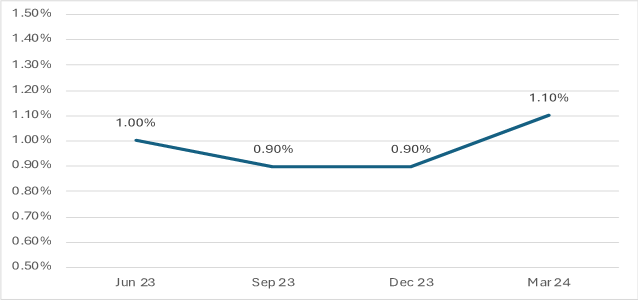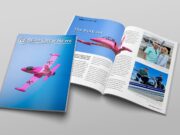
The Jobs Economy
In spite of what you may have heard about the various jobs reports, compensation levels in private industry continue to rise. After dipping below 1% in Q3 and Q4 of last year, the three-month increase in private industry compensation rose to 1.1% in Q1 of this year. That means that over the three-month time frame of January to March 2024, wages for all workers in private industry rose an average of 1.1%. That makes the yearly average growth for all workers 3.9%. While that is 1% less than the yearly average growth for the previous twelve months, the operative word here is growth – compensation in the general economy is still growing. Correspondingly, the AirComp Calculator database has also been aged one year and the average growth in all fourteen positions across multiple surveys has been 4.98%. The positions with the highest average growth were flying positions at around 6%: captain, senior captain, chief pilot, flight attendant and senior flight attendant. The positions with the lowest growth were technician and scheduling positions at around 4%.

The takeaway from all these statistics is that compensation levels are never stagnant; they are always growing. Aviation managers should review compensation levels for their teams regularly, at least on an annual basis. Individual professionals should do the same. The day you rest on your laurels, compensation-wise, is the day you start losing personnel.
LTI
In my last article, I discussed the importance of long-term incentive payments in a compensation package. Remember that short-term incentives pay in the same year they are earned or awarded, but LTI plans typically pay in three to five years and they are either equity or cash based (WorldatWork, 2021).
There are several different types of LTI vehicles, and the breakdown appears in the table below.

- Restricted Stock Award (RSA) – Grants of stock or stock units subject to restrictions until the employee has worked for the company for a specified period. The employee may receive or accrue dividends during the vesting period.
- Other – Includes Phantom Stock and Stock Appreciation Rights.
- Performance Shares Plan – A conditional stock or stock unit award plan in which the payout is determined by the company's achievement of specified performance goals over several years. The value of the share is equal to market value of common stock at end of performance period.
- Long-Term Cash Award – Cash paid out based on growth or decline of grant amount over a specified multi-year period.
- Incentive Stock Option (ISO) – An option that qualifies for favorable tax treatment (no tax at exercise and treatment is at capital gains tax rate), granted to an employee to purchase company stock at a specified price for a specified period.
- Non-Qualified Stock Options (NQSO) – An option that does not qualify for favorable tax treatment (tax at exercise), granted to an employee to purchase company stock at a specified price for a specified period. Also called non-statutory stock option. (NBAA, 2023) (Gallagher, 2023).
Restricted stock awards are the most common vehicle used. Typically, an employee will be awarded stock with a certain face value each year. Then, the stock will vest over a period of time, like three years. An example would be that an employee would receive an LTI award of $12,000 in the current year, but only $4,000 would vest by the end of that year. The next year, the employee would get another $4,000, and then $4,000 in the final year. But, in the second and final year, the employee would also get additional $12,000 awards, so eventually, the employee would realize the entire $12,000 in one year, from multiple awards. The only down-side to restricted stock is that it’s usually only available for personnel in flight departments that are operated by publicly held companies.
The most popular LTI vehicle that is not stock based is long-term cash. This is a form of deferred compensation that many smaller operators can utilize if they want to offer LTI to their employees, but it requires infrastructure that a smaller operator may not be able to support.
Overall, LTI can be a very useful tool for retention if aviation managers and their HR compensation business partners can package it in a way that it offers a value proposition to the employee and creates a disincentive for employees to depart. Certainly, there are a lot of variables in this equation, but in addition to the dollar amounts involved, LTI shows that the organization is making the effort to motivate employees to stay and often that effort goes a long way.
Technician Compensation
As I mentioned above, technicians were among the positions with the smallest wage growth in the 2022-2023 period, with maintenance technicians increasing a mere 3.18% over that timeframe, less than the average increase for all private industry workers. At the recent NBAA Maintenance Conference in Portland, I offered those who came by my table a free review of their compensation versus AirComp Calculator data. Usually, when there are pilots in the crowd, the results are 50-50. Some will have comp levels that map at the 50th percentile or better and other will have comp that is lower. But at the Maintenance Conference, with one exception (a DOM in a unique position), every one of the personnel who stopped by mapped not only low versus Calculator data, but very low. To call that shocking would be putting it mildly.
The fact is, we’re doing a terrible job of paying technicians fairly in our industry. When they can make more money turning wrenches on a luxury car than they can turning wrenches on a jet, where the stakes are far higher, we, as owners, principals, aviation managers, and leaders, have our priorities in an epically bad place.
Bibliography
Gallagher. (2023). 2023 Aviation Compensation Survey. Quincy, MA: Arthur J. Gallagher & Co. .
NBAA. (2023). 2023 Compensation Survey. Washington: National Business Aviation Association. WorldatWork. (2021). Total Rewards Management. Phoenix: World at Work.


















































